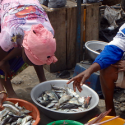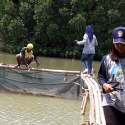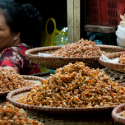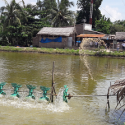Innovation for Seafood Sustainability and Nutrient Security in Southeast Asia
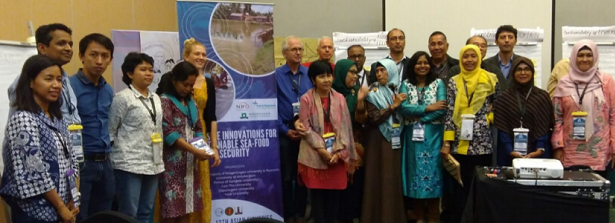
During a special session on Sustainable Sea-Food Security last April 10, 2019 at the 12th Asian Fisheries and Aquaculture Forum (AFAF), partners of four NWO-WOTRO funded Global Challenges Programme (GCP) projects and one Applied Research Fund project (ARF)1 discussed with stakeholders of the fisheries and aquaculture sector from policy and practice. The session had three goals: (1) Knowledge exchange between the NWO-WOTRO funded projects working on the seafood value chain, (2) Exchange with stakeholders of the sector who are not related to the project, (3) identification of constraints to inclusion of small farmers and fishers in development.
The research and development- related projects were tackled in two sessions: the “Ecological Opportunities of Pond Aquaculture” and the “Design of Aquaculture Innovations”. Various recommendations were developed, such as: reduce of water use by in-pond water re-circulation; explore public-private partnerships for co-creation; adjust policies to push recovery of mangrove (see the Report page 3-5 and Annexes).
The third session, a World-café workshop, opened space for conversations focused on four issues: sustainable aquaculture, fisheries management, innovation through co-creation, and inclusive business ( see pages 6-10 of the Annex). Below are the conclusions from these conversations:
- To contribute to seafood sustainability and nutrient security, aquaculture should produce more from limited land, water and other resources by upgrading systems, considering ecological principles, reducing the use of fish for feed, and integrating smartly with agriculture and nature (mangrove), while keeping an open eye for food quality issues (no residues, and enough HUFA), and exploring the use of fees and public-private partnerships. Always consider that using feed and chemicals may disturb an ecological balance and thus threaten long-term productivity.
- Most of the management practices for sustainable fisheries listed by the workshop (see the Report) are already being done, but are not well implemented, or have failed to control over-fishing. This means that the governance aspect of the common property resource is not well- understood, agreed upon, or considered by researchers and policymakers. For example, some measures may be counter-productive in an open-access system, such as providing social security and insurances for fishers could lead to more people getting into fisheries, thus further degrading the resources.
- Most constraints to innovation in aquaculture listed in the Report are related to disconnections between local farmers and the state’s policies and extension services. The latter should make sure that socio-economic benefits of proposed solution are higher than that of the current practice, while saving biodiversity. Co-creation by farmers, NGOs, business and state is a way to achieve this. Including the private sector in the innovation process comes with risks of profit capture. The process needs to be controlled and farmers protected through contracts.
- The main stumbling block for inclusiveness is the policymakers’ focus on rapid large-scale economic development and their neglect of the aquaculture done by the resource-poor farmers.
Concluding, one can say that the session allowed a fruitful exchange of knowledge and opinions between stakeholders representing producers, and representatives of advocacy, development, policy and research organisations. As a follow up of this session, related to the identified constraints, participants agreed to consider the findings and recommendation to further the research and development towards more sustainable shrimp production, and organizers will distribute the session reports and stimulate further debates on non-science based opinions, rules and programs hampering inclusive development.
Footnotes
- 1. NWO-WOTRO GCP projects Nutritious-Ponds, PASMI, ALEGAMS, Fish4Food, and ARF project Mangrove Polders.


